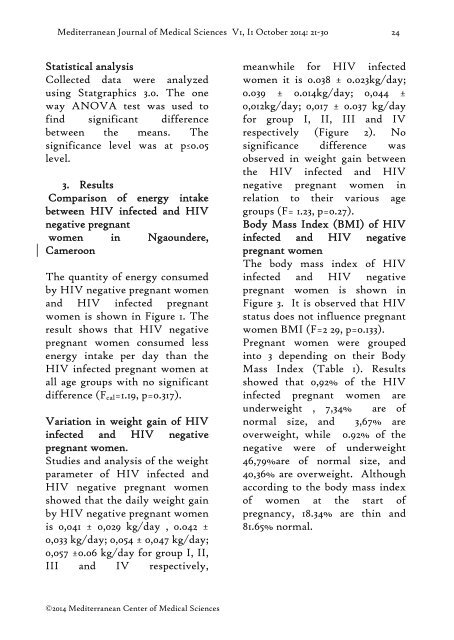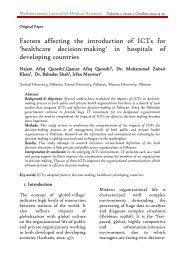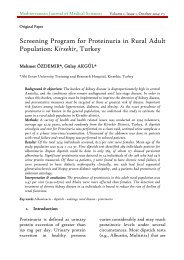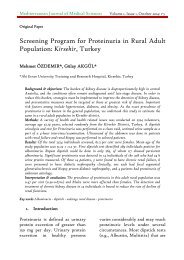Assessment Of Nutritionnal Status Of Hiv Infected And Hiv Negative Pregnant Women In Ngaoundere, Cameroon
Background & objectives: Malnutrition (underfeeding) can affect the treatment of AIDS in that it reduces the ability of the intestine to absorb drugs, organic substances and micronutrients. Underfeeding could also increase the chances of transmission of the disease from an infected mother to the baby during pregnancy. The objective of this study is to compare the energy intake, weigh rate and nutritional status between the HIV and non HIV pregnant women attending two referrals hospitals in Ngaoundere (Cameroon). Methods:A cross sectional study using 24-hour dietary recall was applied to a sample of 109 women, randomly selected from a population-based and anthropometric data were done. Results: Result show that HIV negative pregnant women consumed less energy intake per day than the HIV infected pregnant women at all age groups with no significant difference (Fcal=1.19, p=0.317). Gain in weight between the HIV infected and HIV negative pregnant women in relation to their various age groups was no significant (F= 1.23, p=0.27). There was no significant influence of HIV status in pregnant women BMI (F=2 29, p=0.133). Interpretation & conclusion:In this study, the higher consumption of energy by HIV infected pregnant women than HIV negative women could be because HIV infected pregnant women were at the beginning of the infection which has not yet affected the immune system. In the two referral hospital of Ngaoundere besides HIV screening tests, should be also nutritional services to advice these women on their nutritional habits. Keywords: Malnutrition, Body mass Index, HIV/AIDS, energy consumption
Background & objectives: Malnutrition (underfeeding) can affect the treatment of AIDS in
that it reduces the ability of the intestine to absorb drugs, organic substances and
micronutrients. Underfeeding could also increase the chances of transmission of the disease
from an infected mother to the baby during pregnancy. The objective of this study is to
compare the energy intake, weigh rate and nutritional status between the HIV and non HIV
pregnant women attending two referrals hospitals in Ngaoundere (Cameroon).
Methods:A cross sectional study using 24-hour dietary recall was applied to a sample of 109
women, randomly selected from a population-based and anthropometric data were done.
Results: Result show that HIV negative pregnant women consumed less energy intake per
day than the HIV infected pregnant women at all age groups with no significant difference
(Fcal=1.19, p=0.317). Gain in weight between the HIV infected and HIV negative pregnant
women in relation to their various age groups was no significant (F= 1.23, p=0.27). There was
no significant influence of HIV status in pregnant women BMI (F=2 29, p=0.133).
Interpretation & conclusion:In this study, the higher consumption of energy by HIV infected
pregnant women than HIV negative women could be because HIV infected pregnant women
were at the beginning of the infection which has not yet affected the immune system. In the
two referral hospital of Ngaoundere besides HIV screening tests, should be also nutritional
services to advice these women on their nutritional habits.
Keywords: Malnutrition, Body mass Index, HIV/AIDS, energy consumption
Create successful ePaper yourself
Turn your PDF publications into a flip-book with our unique Google optimized e-Paper software.
Mediterranean Journal of Medical Sciences V1, I1 October 2014: 21-30 24<br />
Statistical analysis<br />
Collected data were analyzed<br />
using Statgraphics 3.0. The one<br />
way ANOVA test was used to<br />
find significant difference<br />
between the means. The<br />
significance level was at p≤0.05<br />
level.<br />
3. Results<br />
Comparison of energy intake<br />
between HIV infected and HIV<br />
negative pregnant<br />
women in <strong>Ngaoundere</strong>,<br />
<strong>Cameroon</strong><br />
The quantity of energy consumed<br />
by HIV negative pregnant women<br />
and HIV infected pregnant<br />
women is shown in Figure 1. The<br />
result shows that HIV negative<br />
pregnant women consumed less<br />
energy intake per day than the<br />
HIV infected pregnant women at<br />
all age groups with no significant<br />
difference (F cal =1.19, p=0.317).<br />
Variation in weight gain of HIV<br />
infected and HIV negative<br />
pregnant women.<br />
Studies and analysis of the weight<br />
parameter of HIV infected and<br />
HIV negative pregnant women<br />
showed that the daily weight gain<br />
by HIV negative pregnant women<br />
is 0,041 ± 0,029 kg/day , 0.042 ±<br />
0,033 kg/day; 0,054 ± 0,047 kg/day;<br />
0,057 ±0.06 kg/day for group I, II,<br />
III and IV respectively,<br />
meanwhile for HIV infected<br />
women it is 0.038 ± 0.023kg/day;<br />
0.039 ± 0.014kg/day; 0,044 ±<br />
0,012kg/day; 0,017 ± 0.037 kg/day<br />
for group I, II, III and IV<br />
respectively (Figure 2). No<br />
significance difference was<br />
observed in weight gain between<br />
the HIV infected and HIV<br />
negative pregnant women in<br />
relation to their various age<br />
groups (F= 1.23, p=0.27).<br />
Body Mass <strong>In</strong>dex (BMI) of HIV<br />
infected and HIV negative<br />
pregnant women<br />
The body mass index of HIV<br />
infected and HIV negative<br />
pregnant women is shown in<br />
Figure 3. It is observed that HIV<br />
status does not influence pregnant<br />
women BMI (F=2 29, p=0.133).<br />
<strong>Pregnant</strong> women were grouped<br />
into 3 depending on their Body<br />
Mass <strong>In</strong>dex (Table 1). Results<br />
showed that 0,92% of the HIV<br />
infected pregnant women are<br />
underweight , 7,34% are of<br />
normal size, and 3,67% are<br />
overweight, while 0.92% of the<br />
negative were of underweight<br />
46,79%are of normal size, and<br />
40,36% are overweight. Although<br />
according to the body mass index<br />
of women at the start of<br />
pregnancy, 18.34% are thin and<br />
81.65% normal.<br />
©2014 Mediterranean Center of Medical Sciences








